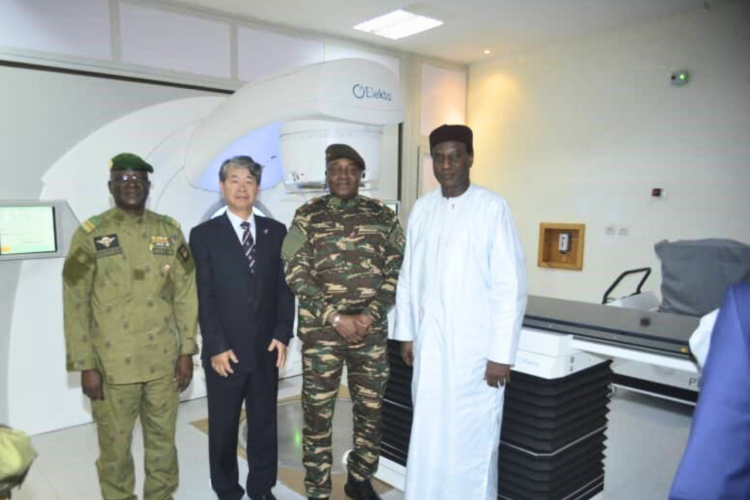Cancer is a growing healthcare challenge in Niger, with over 11 000 new cases and more than 8800 cancer related deaths reported in 2022. Radiotherapy - a treatment needed in nearly half of all cancer cases - remains in short supply in the country, and even those who can afford access to it are let down by out-of-date equipment.
Through its Rays of Hope initiative, the IAEA is supporting efforts to strengthen radiotherapy services in Niger, aiming to expand access to cancer care where it is needed most.
Through the initiative, the IAEA supported Niger in establishing a new cancer treatment facility with state-of-the-art equipment including medical linear accelerator (LINAC), a computed tomography-simulator, an advanced treatment planning system, dosimetry equipment and related accessories.
The new equipment will help expand services for radiotherapy at Niger's only public radiotherapy centre, which serves a population of 24 million people. Medical professionals will be able to treat tumours more accurately through the country's new equipment, while sparing normal tissues and critical organs. More Nigerien cancer patients can also be treated locally without having to travel abroad for care.
"The presence of this machinery in our country will significantly enhance the quality of life for the people of Niger, as it will lead to a considerable decrease in treatment costs and medical evacuations", said Abdourahamane Tchiani President of Niger.
Better Equipment

Inauguration of new linac bunker in October 2024 with Niger President Abdourahamane Tchiani and IAEA Deputy Director General Hua Liu. (Photo: IAEA).
In 2021, Niger established its first-ever radiotherapy facility - the National Cancer Centre - after more than a decade of preparation, support and technical expertise from the IAEA. Since its inauguration that year, the centre has used a Cobalt-60 machine and a conventional simulator to care for cancer patients. However, as cancer cases rose, so did the need for equipment and services. The IAEA responded by expanding its support to Niger via Rays of Hope.
"Through the Rays of Hope initiative, the IAEA aims to address the urgent need for radiotherapy by providing technical support, capacity building and state-of-the-art technology," said IAEA Deputy Director General and Head of Department of Technical Cooperation Hau Liu during the inauguration ceremony for the new center in October.
"Advanced radiotherapy technology will contribute to saving countless lives by improving the treatment of cancer patients, as well as enhancing Niger's capacity to provide timely, precise and effective care to those in need."
Training Medical Professionals
Along with helping secure radiotherapy equipment, the IAEA has also provided expertise and assistance to build up Niger's radiation medicine workforce. Over 32 radiation oncologists, medical physicists, radiation therapy technologists and oncology nurses working at the National Cancer Centre have participated in IAEA trainings.
"For over 60 years, our radiation oncologists and medical physicists have worked closely with countries to help establish and expand radiotherapy facilities. Among other things, we provided expertise on design, equipment selection, specification and procurement; capacity building activities; training; and quality assurance," said May Abdel-Wahab, Director of the IAEA Division of Human Health.
Power of Partnerships
While the world has seen an 18 per cent increase in radiotherapy machines since 2015, the recently released report of the IAEA-led Lancet Oncology Commission on Radiotherapy and Theranostics shows that significant gaps remain.
Rays of Hope support to Niger comes at a timely moment for a country seeking to build up its cancer care infrastructure and services.
"The IAEA's support also included facilitating an effective partnership between Niger and the Islamic Development Bank which provided the financial support to Niger in the procurement of the LINAC," said Shaukat Abdulrazak, Director of the IAEA's Division for Africa.
Under Rays of Hope, the United States of America has also supported Niger by contributing to the procurement of the computed-tomography and the training of health professionals.
The 2025 Rays of Hope Forum will take place from 30 June to 2 July 2025 in Addis Ababa, Ethiopia, and will reflect on three years of progress and action toward #CancerCare4All.






